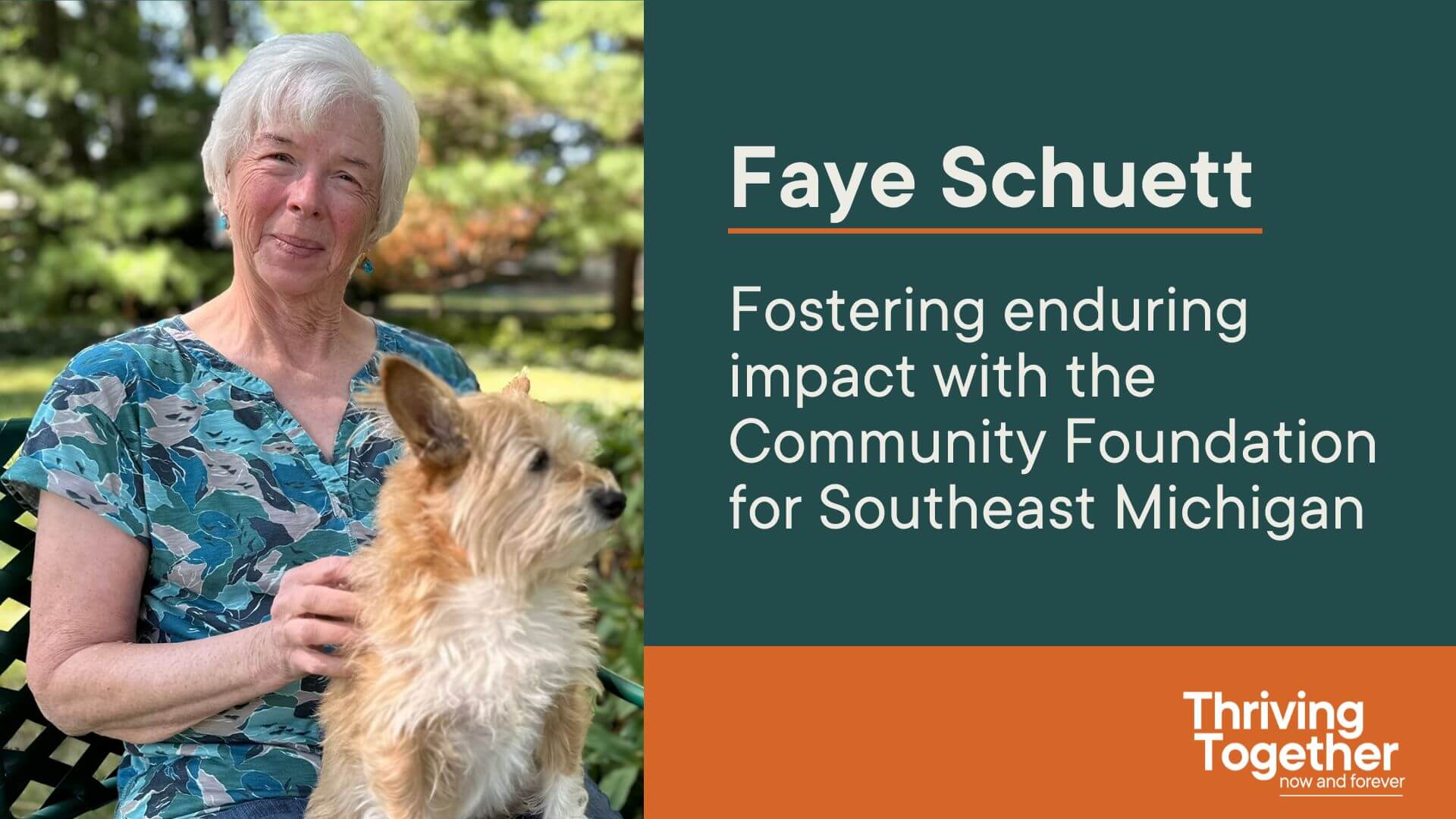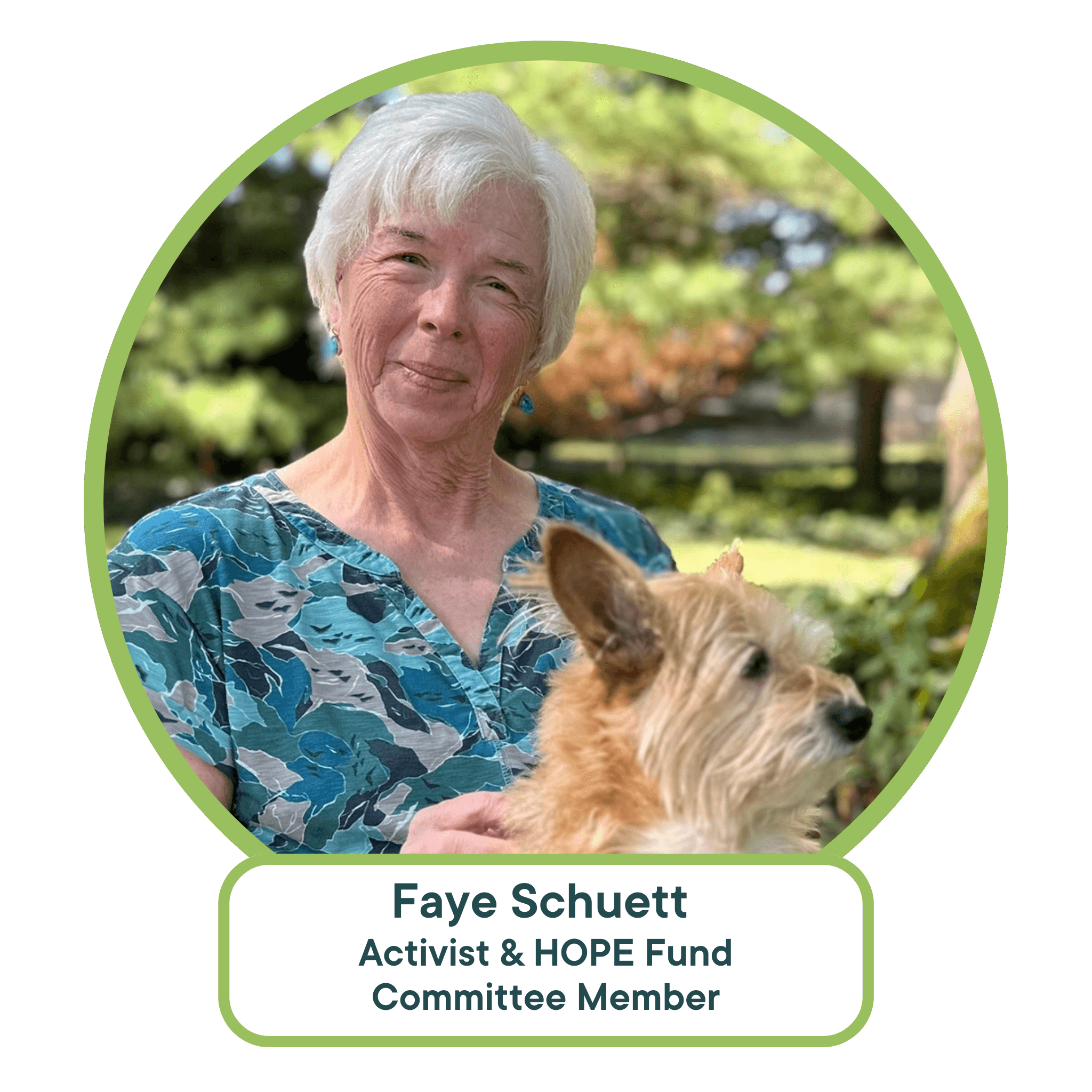
This article first appeared in Between the Lines
For decades, Faye Schuett, alongside her late wife Linda Seaver Burnett, has championed LGBTQ+ rights, blending activism with philanthropy to create lasting change. Her deep commitment to equality has long been intertwined with her relationship with the Community Foundation, particularly through its HOPE Fund.
This fund, a pioneering initiative in Michigan advancing LGBTQ+ equality, has amplified Schuett’s impact for years, ensuring resources and support reach organizations doing crucial work for the LGBTQ+ community. The partnership between Schuett and the Community Foundation stretches back many years and has created immeasurable positive change throughout southeast Michigan.
Building a Connected Community for Change
For Schuett, professor emerita of English at Schoolcraft College, activism is profoundly personal. Her journey began in Tulsa, Oklahoma with the challenges she and Burnett faced in securing their legal rights as an LGBTQ+ couple. “It wasn’t easy,” Schuett recalls. “We had to navigate the complexities of ensuring our relationship was protected in ways that other couples didn’t have to think about.” These experiences shaped their broader mission, turning personal hardship into a cause that would benefit the entire LGBTQ+ community. First in Oklahoma, and later in Michigan, they educated themselves and others, sharing resources with fellow LGBTQ+ couples striving for equality and legal protection.
“We started by gathering friends together,” Schuett says, “and educating ourselves on how to secure legal rights. It was about making sure we were protected, but also about sharing that knowledge with others.”
This personal mission soon transformed into a lifetime of activism. Schuett and Burnett became involved in grassroots movements throughout Michigan, eventually playing a role in the Peninsula Group, a coalition that worked to unite LGBTQ+ organizations across the state. This movement was about much more than individual couples securing their legal rights. It was about creating a stronger, more connected community that could advocate for widespread, systemic change. Schuett reflects, “It was always about the bigger picture. We knew that by coming together as a community, we could make a difference that would benefit everyone.”
As their activism grew, so too did their involvement in philanthropy. Though Schuett and Burnett did not consider themselves wealthy, they understood the power of financial support. “We weren’t rich,” Schuett explains, “but we could still make a difference with what we had. Small, consistent donations can really add up over time.” The couple began contributing to various LGBTQ+ organizations, including Affirmations, the ACLU’s LGBT Project, Ruth Ellis Center, LGBT Detroit, as well as the HOPE Fund at CFSEM. They believed that their activism and philanthropy went hand in hand, each effort reinforcing the other.
Philanthropy and Activism: A Powerful Partnership
The HOPE Fund, in particular, became a central part of their philanthropic vision. Created by the Community Foundation for Southeast Michigan in 1994, the HOPE Fund was designed to support LGBTQ+ organizations and initiatives in the region for generations. Over the years, this endowed fund has provided millions of dollars in grants to groups working on behalf of the LGBTQ+ community, from direct services to advocacy and education and continues to grow through investments and donations.
Schuett’s partnership with the Community Foundation for Southeast Michigan has been essential in helping her channel her resources and activism into meaningful, sustainable impact. The Foundation’s emphasis on long-term sustainability and collaboration resonated deeply with Schuett. “The Foundation’s approach aligns perfectly with what I’ve always believed,” she says. “It’s about ensuring that the organizations we support are not just surviving, but thriving.”
Through the HOPE Fund, Schuett and its other donors have championed several key projects that have helped build capacity for LGBTQ+ organizations in Southeast Michigan. The Fund’s focus on sustainability has allowed these groups to grow, work with each other and ally organizations and become more effective advocates for change. Schuett is particularly proud of the Fund’s ability to foster collaboration between different organizations, encouraging them to share resources and knowledge rather than competing for limited funds.
For Schuett, the ability to create lasting impact with the Community Foundation has been one of the most rewarding aspects of her philanthropic journey. “I’ve always believed that change doesn’t happen overnight,” she says. “You have to be in it for the long haul. That’s what I love about the Community Foundation — they’re focused on creating long-term solutions, not just quick fixes.”
One of the things Schuett appreciates most about the Community Foundation is how it makes philanthropy accessible to all donors, regardless of their financial situations. Through programs like monthly giving, individuals are able to contribute consistently to the causes they care about without feeling overwhelmed by the financial commitment. “The Community Foundation makes it easy for everyone to contribute, no matter how much you have to give,” she notes. “It’s not about how much you can donate; it’s about being part of something bigger than yourself.”
As Schuett looks to the future, she hopes the next generation of LGBTQ+ philanthropists and activists continue building on the progress that has been made. “There’s still so much work to be done,” she says. “We’ve made a lot of progress, but we can’t afford to become complacent.” Schuett is hopeful that younger generations will take up the mantle of both activism and philanthropy, understanding that both are necessary to achieve lasting change.
She encourages young people to see philanthropy not just as an obligation, but as a powerful tool for creating the world they want to see. “Activism is crucial, but philanthropy allows us to build the infrastructure that makes that activism sustainable,” Schuett explains. “Without financial support, the organizations doing this important work can’t survive.”
Schuett still works toward her vision of an inclusive, sustainable and thriving region for all. She hopes that future generations will continue prioritizing collaboration and long-term impact, just as the Community Foundation has done. “I want to see a future where LGBTQ+ organizations are not only surviving but flourishing, where they have the resources and support they need to make a real difference,” she says.
Inspiring a Legacy of Partnership and Equality
In the end, Schuett’s legacy is one of partnership — partnership with the Community Foundation, with the organizations she has supported, and with the broader LGBTQ+ community. Her hope is that her work will inspire others to get involved, to contribute in whatever ways they can and to continue the fight for equality and justice.
As Schuett puts it, “We all have a role to play in making the world a better place. It doesn’t matter how much money you have or how much time you can give. What matters is that you show up, that you contribute and that you’re committed to the cause.”
Schuett’s story is a reminder that anyone can make a difference, no matter where they come from or what resources they have. Schuett calls on emerging LGBTQ+ philanthropists to connect with the Community Foundation for Southeast Michigan and the HOPE Fund, urging them to become part of a movement that creates permanent, positive change for LGBTQ+ individuals in the region. Through collaboration, consistent giving and a commitment to equity, Schuett’s vision for a stronger, more inclusive community can become a reality for generations to come.
Discover how you can help create a region where we can all thrive together, now and forever.
